Review for Bleach The Movie: Memories Of Nobody
Introduction
Why did it have to be Bleach? It did start off promisingly enough; with a very appealing first season, but since then the series has become very po-faced, repetitive and basic shonen stuff. If it was any drier than it is at the moment with Season 8, it would become Fist of the North Star. There are so many other long running anime franchises out there. We could have had the rest of Yu Yu Hakusho, One Piece, Gintama, Detective Conan, but instead we have regular explosions of chi with massive swords oozing excessive machismo and testosterone. I've come to look forward to the Bleach movies as a return to those early days when there was actual storytelling, character, and humour in the show. In the first half of 2012, Manga Entertainment are catching up on Bleach, releasing Season 8 and 9 in relative short order. In fact May is a veritable deluge of Bleach, with Season 8 Part 2 on DVD and the 3 Bleach movies making their UK Blu-ray debuts. Having seen Season 8, my heart sank at the prospect of all this Bleach, until I realised that I would get to see the first movie again, this time in high definition. From this point forward, anything in italics is taken from my review of the DVD.
You'd think that a teenager's life would be complicated enough if he could speak to ghosts. But that was only the beginning for Ichigo Kurasaki. When he literally bumped into a Shinigami named Rukia Kuchiki, he was introduced to a whole new world. The Shinigami's mission is to guide forlorn spirits known as Wholes to the Soul Society, and protect them and the living from Hollows, perverted spirits that have become monsters that prey on other souls, living or dead. They are not supposed to let the living know about this supernatural world, but not only did Ichigo see Rukia, circumstances forced her to give him her powers, and train him to be a Shinigami while she regained her strength.
Following the Soul Society arc of the series, Ichigo and Rukia are back in the living world, and back to work as Shinigami, protecting everyone from the scourge of Hollows and making sure that lost souls get directed to the Soul Society, so that the circle of life, death and rebirth can continue. Except that suddenly it seems that the circle is broken, and there is a new player in town. Ichigo and Rukia investigate a source of intense spiritual pressure, and find an infestation of blanks, soulless spirit forms. Before they can be overwhelmed, a new Shinigami arrives, and effortlessly deals with them. She is Senna, although oddly she has no memories of the past, of the Soul Society or any of the other Shinigami, she just fights on instinct. While Rukia goes back to the Soul Society, she tells Ichigo to stick with Senna, to find out more about her. While Ichigo is on a wild goose chase, trying to keep up with the playful Senna, Rukia finds out what is going on, and it's bad. A banished clan of Shinigami are back from their exile to the Dangai Precipice World and they want revenge. They plan to destroy the Soul Society that betrayed them, and if the living world perishes it's just collateral damage. Key to their plans is the amnesiac Shinigami Senna.
Picture
We're the first English language territory to get the first two Bleach films on Blu-ray. That put a grin on my face, as with Blu-ray we're past all that NTSC-PAL conversion nonsense. Except that with Memories of Nobody, we aren't. In fact, in some respects, this is back to the bad old days of anime conversions to UK home media. The thing is that Bleach: Memories of Nobody's runtime confuses the hell out of me. The US DVD release from Viz, an NTSC disc runs to 93 minutes, which I assume is the film's actual runtime. The Australian R4 disc has a sub 90 minute runtime which indicates a film to PAL transfer with 4% speedup, although the listed 87 minutes is a little short. The Manga DVD released here three years ago has a 97 minute runtime, which not only indicates an NTSC-PAL conversion, but an extra 4% slowdown, some sort of overcompensation. It seems that only the US has got it right so far.
But as I said, Blu-ray ought to solve all that. But Bleach the Movie: Memories of Nobody gets a 1080i transfer at 50Hz. We're back to the bad old days of frame rate discrepancies, although thankfully at least the resolution stays constant. 50Hz, i.e. 50 fields a second equates to 25 frames per second, which is the same frame rate as PAL. The only ways to get Bleach: Memories of Nobody onto such a disc is to either speed up the playback by 4%, which on DVD would be Film-PAL, use fancy interpolation to create an extra frame each second, resulting in ghosting, and blended frames, which back on DVD would have been NTSC-PAL, or what we finally get here on this disc. The film simply repeats every 24th frame. Bleach: Memories of Nobody runs to 93 minutes, the same length as the US NTSC DVD, and plays back in glorious jerkovision, as the image freezes every twenty-fourth frame. Usually this is unnoticeable, but if there is a pan or a shot of motion that lasts more than a second, the jerkiness becomes obvious, and regular enough that you can set your watch by it.
Bleach The Movie: Memories of Nobody is presented at 1.85:1 widescreen, as mentioned at 1080i 50Hz, and other than the jerkiness mentioned, the HD image is really quite nice. Detail levels are high, compression is non-existent, and the richness of the colours, the depth of the film's artwork are brought across well. You can't get away from the softness that the interlaced transfer applies, and there is a degree of posterization and colour banding which exceeds what I have come to expect from high definition anime transfers, but it really is quite adequate. And, while the frame rate issues are a minor bugbear, the Blu-ray still puts that original Manga DVD to shame (I can't believe that I didn't notice it was running four minutes too long). Still, would it have been too much to ask to source a 60Hz transfer, or even better, a 1080p 24fps film transfer? One thing I noticed on this release of the film, some of the film has been re-edited to insert English language overlays for some of the Japanese text on screen. This isn't a subtitle track, but on the actual print.
Sound
This is a Kaze disc, first released in Europe, so some canny UK importing fans may already have experienced this film in HD. It also means that there are a plethora of language options available to you. You can choose between DTS-HD MA 5.1 Surround English, Japanese, French, Italian, and German. There are French, Italian, German, and English subtitles, and signs only tracks to go with their respective native languages. You also get subtitles in Dutch and Polish.
I went with the Japanese audio with English subtitles and was quite pleased with a robust and vibrant audio experience. The action comes across well, the film's music is nicely balanced, and the dialogue is clear throughout. It's a solid, effective effort that brings out the best in the film. The subtitles are clear and free of error for the most part, except for the odd occasion where an apostrophe was replaced with a question mark.
Extras
The original Manga DVD was an extras free zone, and we were left lusting after the two-disc SE that US fans got. Even the Australians got more than we did in that regard, but fortunately this Blu-ray goes some way to redressing the balance. It being a Kaze disc, it all depends which language you select on the first menu screen. It also limits your options when it comes to subtitle and audio (tough luck if you're a hard of hearing dub fan), and the player doesn't hold the position in memory if you should happen to stop the disc instead of pause it. The first menu offers the choice of English, French, German, Italian, Dutch, and Polish animated menus. The Dutch and Polish menus simply offer the movie, while the French get the lion's share of extras.
They autoplay with trailers for KZTV and Le D'Echeance d'un Homme, while on the disc you'll find further French trailers for Canaan, Une Ete Avec Coo, and Appleseed (I am now lusting after Appleseed on Blu-ray).
Unique to the French menu is an 8 minute recap of Season 1 of Bleach, the TV series, in French quite understandably.
The rest of the other French extras are also accessible from the German, English and Italian menus, although the German menu autoplays with trailers for Detective Conan, Professor Layton and the Eternal Diva, and Summer Wars.
The other extras are the SD Japanese trailers for Memories of Nobody, and an Interview with the Production team of Noriyuki Abe, Masahi Kudo, and Ken Hagino. This runs to 10 minutes, is presented in 576i SD and is hardsubbed in whatever language menu you are in. They talk about creating this movie for a general audience.
There are also a couple of HD extras, and you can watch the film's storyboards scroll by for 13 minutes, while the Preproduction Sketches is a slideshow that lasts just over a minute.
Conclusion
The first Bleach movie turns out to be something pretty amazing. It's saddled with all the problems that a tie-in movie has, a long and complex back-story, an inability to move the plot forward, and an obligation to satisfy fans of the franchise first and foremost. It takes all that baggage, and still managed to tell an entertaining, exciting, and most of all emotionally engaging story. It gives the Bleach universe a truly broad and cinematic scope, it features all the major characters, even if only briefly, and it provides plenty of action, and all the technobabble that existing Bleach fans will demand from the movie, but it turns out to be a downright enjoyable movie in its own right. The biggest issue is that it's truly a film for the Bleach fan, it builds on and uses all that has come before, and anyone new to the franchise will be lost in terms of terminology and character relationships, and all the character cameos will mean nothing to them. The thing is that the main characters, Senna especially are so strongly drawn and universally engaging, and the story's themes are so well brought across, that even a complete Bleach novice will be able to gain some satisfaction from this movie, even if most of the arcane aspects of the plot fly overhead.
It's all down to Senna, the central character in this film. She is surprisingly well written, more than just a guest of the week, layered, complex, engaging, likeable, and playful, and with an excellent voice performance that highlights these aspects. It's the friendship that develops between her and Ichigo that is at the heart of this film, he initially views her with mistrust, and gradually warms to her as they spend more time together. Her story arc is fundamental in this film, her search for her identity, and trying to understand where she came from. It's an appealing vulnerability at the heart of a strong, forthright character, and whenever she is on screen, it's hard to tear the attention away. The emotional connection that forms between her and Ichigo develops naturally, and you can see why he stands up for her, and risks all to save her. I must admit that there was a point, some fifteen minutes from the end, where I was reminded that this was a spin-off movie, unable to alter the series continuity, and I felt a twinge of disappointment. There is no Senna in the TV series, but I really wanted there to be, so integral she seemed to the Bleach universe in the film. But the film manages to give an ending that is poignant, a little tearful, but oddly hopeful as well.
So much for the mushy stuff, Bleach fans will be more interested in the action, and there's plenty of it, Zanpakutos drawn, Bankais flying, and all the major characters from the Soul Society, and all of Ichigo's earthbound friends making an appearance. Orihime, Chad and Uryu may have little to do in this film, but after the Soul Society arc, it was good to see all the Shinigami Squads fighting on the same side for a change. There are plenty of good guy bad guy confrontations to the film, and the conclusion is a good 20-minute action sequence. You certainly won't be disappointed in that regard.
This is now the third time that I have watched Bleach The Movie: Memories of Nobody, and I fall in love with it a little more each time. It just gets better and better. I don't think I appreciated just how much it transcends its source material when I first saw it. It takes the usual shonen fare and crafts an emotionally resonant and moving story. In Senna, it gives us a character to care about, and seeing what Ichigo goes through to protect her helps us empathise with him as well. Especially now, having recently watched Season 8 of Bleach, I realise that Memories of Nobody is in a whole other realm compared to the series. It isn't very often that you see such transformative adaptations of television material to the big screen. Apparently Beautiful Dreamer did it for Urusei Yatsura, while I'm most put in mind of the differences between the Tenchi Muyo OVAs and the third Tenchi Muyo movie, Tenchi in Love 2. That was recognisably Tenchi Muyo, but the story was so unlike the TV series it alienated as many fans as it enthralled. I get the same sense from Memories of Nobody, and years from now, when the series has been consigned to the dustbin of history, I'll still be happy to watch this movie. It completely outshines the series that spawned it.







































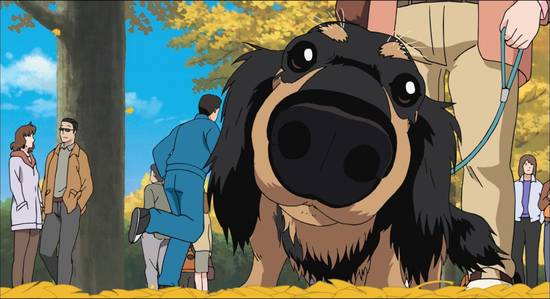
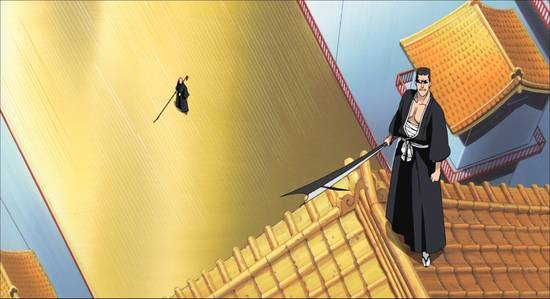
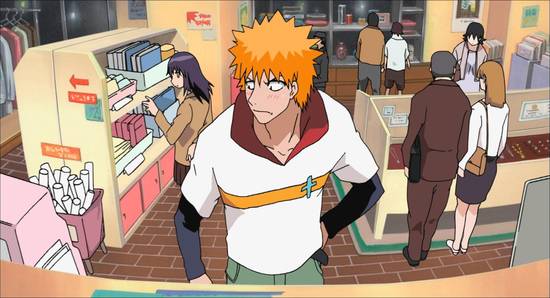
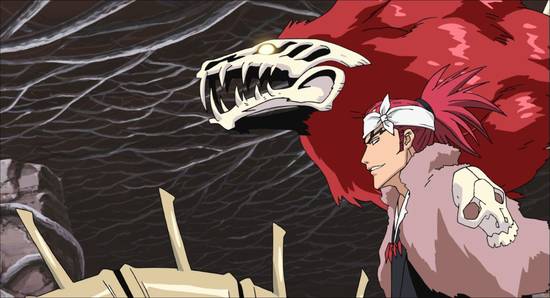
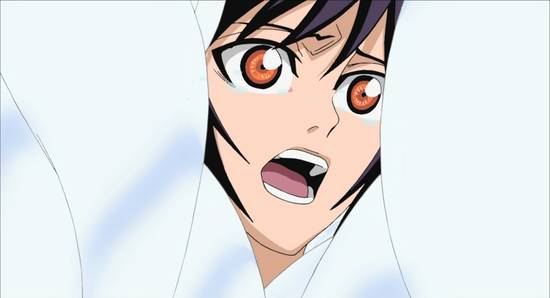
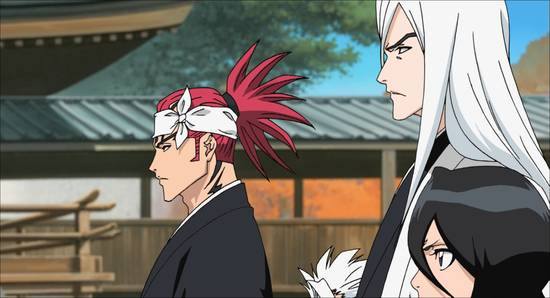
Your Opinions and Comments
Be the first to post a comment!